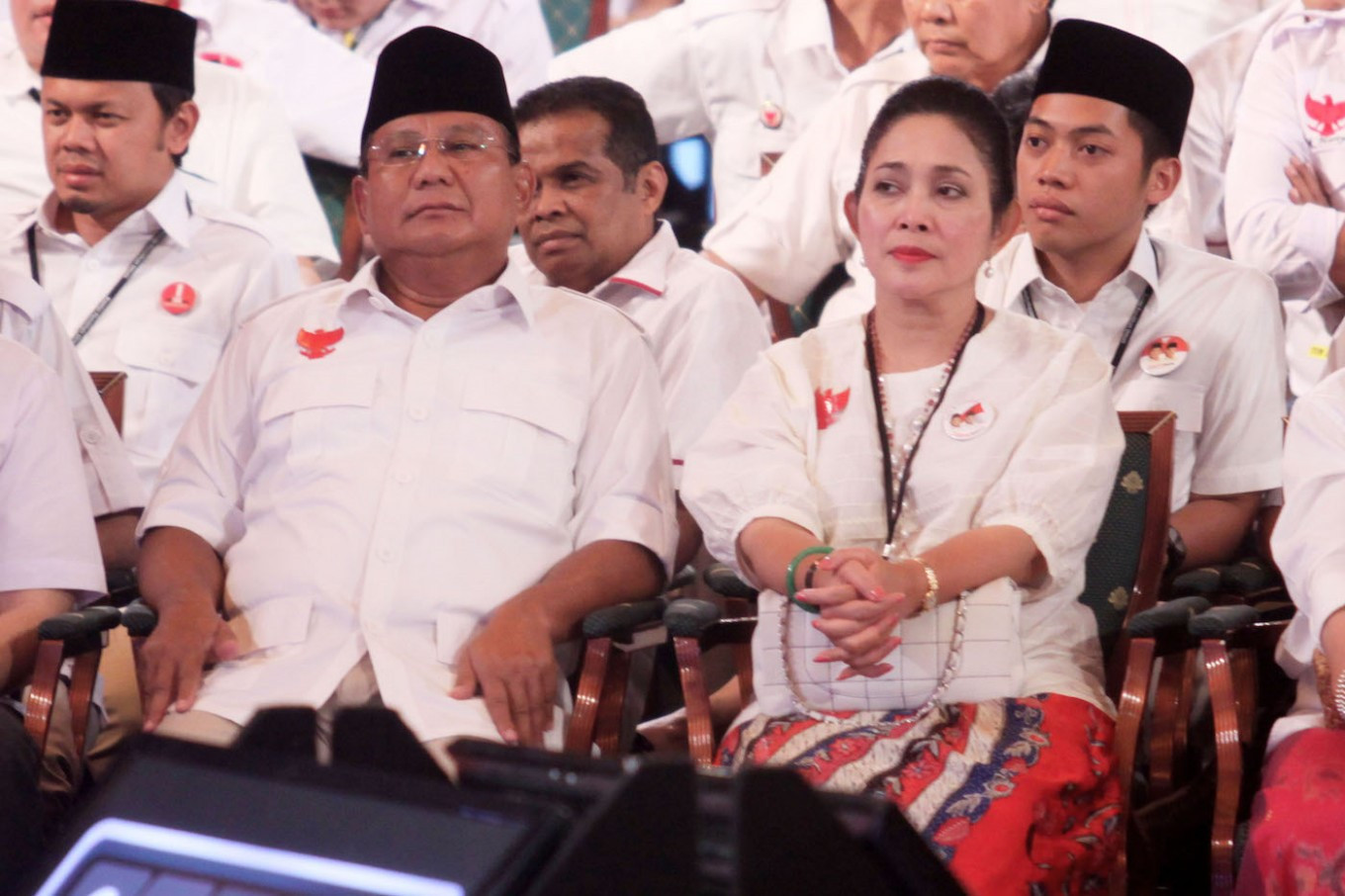News
Cronyism reawakens as Prabowo caves in to top tycoons
Tenggara Strategics March 17, 2025 Presidential candidate Prabowo Subianto (second left) sits beside former wife Titiek Soeharto during an election debate event in Jakarta on June 29, 2014. (JP/Dhoni Setiawan)
Presidential candidate Prabowo Subianto (second left) sits beside former wife Titiek Soeharto during an election debate event in Jakarta on June 29, 2014. (JP/Dhoni Setiawan)
President Prabowo Subianto has positioned himself as a populist leader, launching ambitious initiatives to appeal to the broader public. However, his recent meet-ups with the country’s top business magnates have raised suspicion over his underlying intentions.
On March 6 and 7, Prabowo invited several business tycoons to his office, welcoming Anthony Salim, Sugianto “Aguan” Kusuma, Prajogo Pangestu, Garibaldi “Boy” Thohir, Franky Oesman Widjaja, Dato Sri Tahir, James Riady and Tomy Winata in a closed-door meeting on the first day. The discussion was later revealed to have revolved around their potential role in aiding ambitious government projects like the free nutritious meal program, as well as others in infrastructure, textiles and industries and the recently established sovereign wealth fund (SWF), Danantara, and support the President’s food and energy self-sufficiency agenda.
The same tycoons also attend a meeting on the second day, along with ministers and other business moguls like Andi Syamsuddin “Haji Isam” Arsyad, Anindya Bakrie, Chairul Tanjung and Hilmi Panigoro, as well as United States billionaire and hedge fund manager Ray Dalio. The President said he had invited Dalio to provide critical guidance on Danantara, which has been met with controversy from analysts. Prabowo also used the occasion to introduce Dalio to his brother and key adviser Hashim Djojohadikusumo, a businessman.
Prabowo’s actions have drawn comparisons to autocrat Soeharto, his former father-in-law, who often looked to billionaire friends like Bob Hasan and Sudono Salim, Anthony’s father, to fund national programs. This led to the phenomenon dubbed “koncoisme” (cronyism), under which Soeharto granted exclusive privileges to a select group of business tycoons, allowing them to reap economic rent from monopolies and government contracts.
If Prabowo continues down this path, the problems that plagued Soeharto’s New Order regime could resurface. His engagements with the business elite raises concern about the potential revival of patronage networks, where business interests dominate government projects and policy decisions. As these elite businessmen gain influence, fears of monopolization and cronyism will cast a shadow over his administration.
To his credit, the President’s willingness to publicize these meetings indicates a stark difference from his predecessor Joko “Jokowi” Widodo, who often confided in the same elite businessmen over the 10 years of his two consecutive terms, albeit clandestinely.
Still, concerns have been raised over the involvement of Aguan and Anthony, who have been embroiled in the recent scandal over the illegal installment of a makeshift sea barrier off Tangerang, Banten, and the Pantai Indah Kapuk (PIK) 2 real estate megaproject in North Jakarta.
Allegations regarding their involvement have surfaced over the past couple of months, yet the suspension of investigations into the case has shielded them from further scrutiny. “As the owners of PT PANI [Pantai Indah Kapuk Dua], they are also parties who must be held accountable. This is because the two companies that have been exposed as holders of the HGB (right to build) certificates in the marine area are affiliated with them,” one critic said, referring to the PIK 2 developer. Now that Prabowo is openly aligning with Aguan and Anthony, further legal action seems unlikely.
The two meetings also reflect Prabowo’s struggle to shore up investor confidence following the launch of Danantara. The country’s second SWF, expected to manage the assets of state-owned enterprises (SOEs) worth over US$900 billion combined, has sparked criticisms over the potential for political interference due to the appointment of “all the president’s men” to key leadership positions. “For us, this is great support from the government and businesses for our capital market industry,” said Iman Rachman, executive director of the Indonesia Stock Exchange.
Although Danantara was touted as an instrument to fund government programs without foreign investment, the President’s recent closed-door meetings with the country’s business elite signals his desperate need for extra funds.
Prabowo seems to be scrambling for money from all fronts for his newly introduced initiatives, such as the Red and White Village Cooperatives for disbursing Rp 5 billion each to 70,000 villages and his Sekolah Rakyat (community school) program for providing free schooling to poor students in 100 regions at a price tag of Rp 100 billion per school, on top of his already ambitious programs like the free nutritious meal program.
What we've heard
A politician said that during the two meetings with the business tycoons, President Prabowo had asked his guests to support the establishment of the Danantara sovereign wealth fund and the free nutritious meal program.

